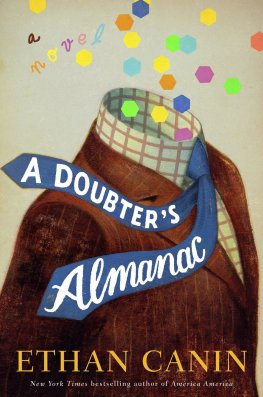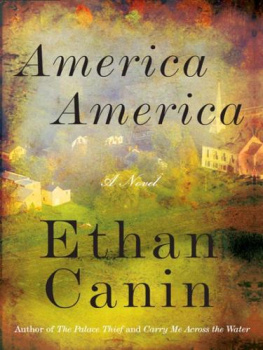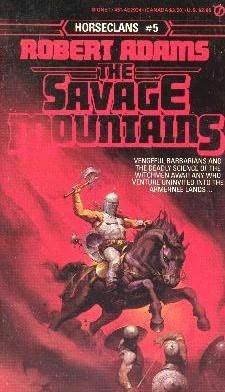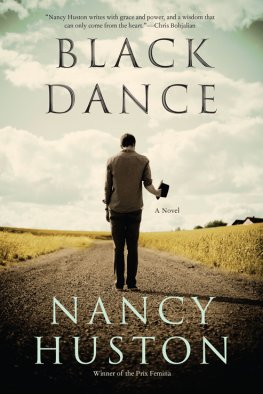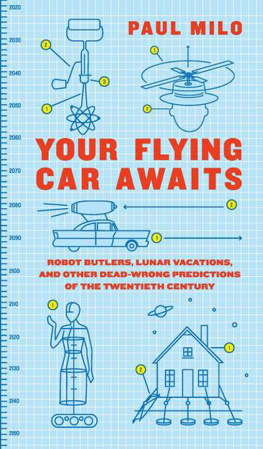Ethan Canin
A Doubter's Almanac
For Barbara, Amiela, Ayla, and Misha,
and for my parents, Stuart and Virginia
If you would be a real seeker after truth, you must at least once in your life doubt, as far as possible, all things.
REN DESCARTES
FROM THE KITCHEN window, Milo Andret watched the bridge over the creek, and when he saw Earl Biettermanns white Citron race across the span he hurried out the door and picked up a short hoe. Biettermann was driving too fast. Reckless was the word for it but thats the way hed always been. Arrogant. Heedless. Lucky to stumble onto the right roads, the right career, the right woman. Lucky even to be alive. For any other driver, the route from the bridge to the cabin would take five minutes: Andret figured it would take Biettermann three.
Outside under the trees, he crossed as quickly as he could toward the garden, his feet today somehow obeying his commands. Next to the strawberries he lowered himself into the folding chair and used the coiled hose to dash a few palmfuls of water onto his shirt and hair. The sun was high. He ought to be sweating.
He heard the car throw gravel as it made the turn into the driveway. Then the engine shut off. A fan came on the way it did in French cars. Biettermann probably loved that fan. One door slam. Andret waited.
Then, a second.
He let them knock at the door to the cabin. His name called: Professor! Professor! This was an affectation. Then steps on the cluttered path to the back of the house, where he was bent low over the plants, pulling strenuously at the roots of a marauding false grape.
Professor Andret!
He turned to offer his greeting, squinting, wiping the spigot water from his brow. A shock: Earl Biettermann was in a wheelchair. He realized hed heard something about that. From her, maybe?
He couldnt remember.
She was here, though that was the important thing and now she was guiding her husband in a wheelchair, pushing him in front of her across the bumpy ground like an offering. It could have been awful: but he saw immediately that it wasnt going to be.
He also realized with a start that shed been the one driving.
MILO ANDRET GREW up in northern Michigan, near Cheboygan, on the western edge of Lake Huron, where the offshore waters were fathomless and dark. The color of the lake there was closer to the stormy Atlantic hues of Lake Superior than to the tranquil, layered turquoise of Lake Michigan, which lapped at the tourist beaches on the far side of the state. Milos father had been an officer in the navy during the Second World War, a destroyers navigator driven by the hope of one day commanding his own ship; but at the age of twenty-four, after an incident in the Solomon Sea, hed abandoned his ambitions. The incident had occurred in November 1943, just a year before Milo was born. Coming north out of the straits near Bougainville Island, the destroyer had been hit by a string of Japanese torpedoes, and in the wake of the explosions the ships life rafts had drifted into unknown waters. Milos father and another sailor had managed to get aboard one of the rafts, and before nightfall theyd picked up two more men. A week later, though, when a British cruiser finally sighted them off of Papua New Guinea, all but Milos father had been eaten by sharks.
By the time Milo was born, his father had been discharged back to Cheboygan, where hed found work as a science teacher at Near Isle High School. It was a position from which, for the next thirty-nine years, he would neither be offered a promotion nor seek one.
Milos mother had been the first female summa cum laude chemistry major in the history of Michigan State University; but she too was willing to forsake her ambitions. She raised Milo until he was old enough to go to school, and then she found a job as a secretary in the sheriffs department in Alpena, the county seat. In Alpena, she typed reports, brewed coffee, and made mild banter with a generally courteous group of men several years her senior, more than one of whom could neither read nor write.
This was most of what Milo knew of the lives of his parents.
After school his father graded homework in his office, and after work his mother sometimes stepped out for a drink with a few of the other secretaries from her building. On most afternoons, Milo walked up the hill from the bus stop to an empty house. By now it was the mid-1950s.
In those days Cheboygan was already something of a resort town, although Milo didnt realize this fact until he was older. For most of his childhood, he knew only the deep woods that ran behind their property350 acres of sugar maple, beech, and evergreen that had managed to remain unlogged during the huge timber harvests that had denuded much of the rest of the state. He spent a good part of his days inside this forest. The soil there was padded with a layer of decaying leaves and needles whose scents mingled to form a cool spice in his nose. He didnt notice the smell when he was in it so much as feel its absence when he wasnt. School, home, any building he had to spend time in they all left him with the feeling that something had been cleaned away.
The shaded hollows of his particular tract were populated by raccoons, skunks, opossum, and owls, and by the occasional fox or porcupine. The small meadows were ringed with ancient birches that crashed to the ground when the younger trees crowded them out, their fallen, crisscrossed trunks making shelters and bridges for him to discover. The woods were in transition, his father had told him. When a great tree came down, the report could be heard for miles, a shifting crescendo of rustling and snapping as the trunk yanked away the limbs around it, culminating finally in a muffled thud like a sledgehammer striking moss. Whenever this occurred, Milo would set out to find the corpse. He had an intricate memory of the landscapes light and shade and could tell instantly when even a small piece of it had been altered. Something in his brain picked up disturbance acutely.
How many hours he spent in those woods! He was an only child and from early in his life had invented solitary games long treks into the landscape with certain self-imposed rules (two right turns to every left, exactly a thousand steps from departure to return, the winding brook crossed only where it bent to the west). These games passed the most precious part of the day for him, the too-short interlude between the time the school bus released him at the bottom of the hill and six oclock, when his mother came out to the edge of the woods holding the lid of a garbage can and banged it three times with a broom handle to call him for dinner.
The Andrets lived fifteen miles from the beaches on Lake Huron; but it might as well have been a hundred. His father stayed to the land in a part of the state where everyone else was drawn to the water. This was no doubt attributable to his experience in the Solomon Sea, but Milo was too young to understand something like that. On weekends his father went hunting with his friends or tinkered around the house, or if the weather was poor he sat in a chair by the fire and worked puzzles from a magazine. In the Andret family, there was never any question of shared recreation no canoe trips, no bicycle rides, no walks together at the shore. Such dalliances were from another universe. There were no pets, either, and no games other than a couple of boxes of playing cards and an old chess set of Philippine ivory that had been brought back from the navy. If Mr. Andret was at home, he was either grading schoolwork or performing household repairs, walking around with a tool belt and setting a ladder against the eaves. He would finish one job and move on to the next, never alerting anyone to what he was doing. If his mother was there, she was in the kitchen, at the small table by the window, with a glass and a book. If Milo wasnt at school, he was in the woods.

